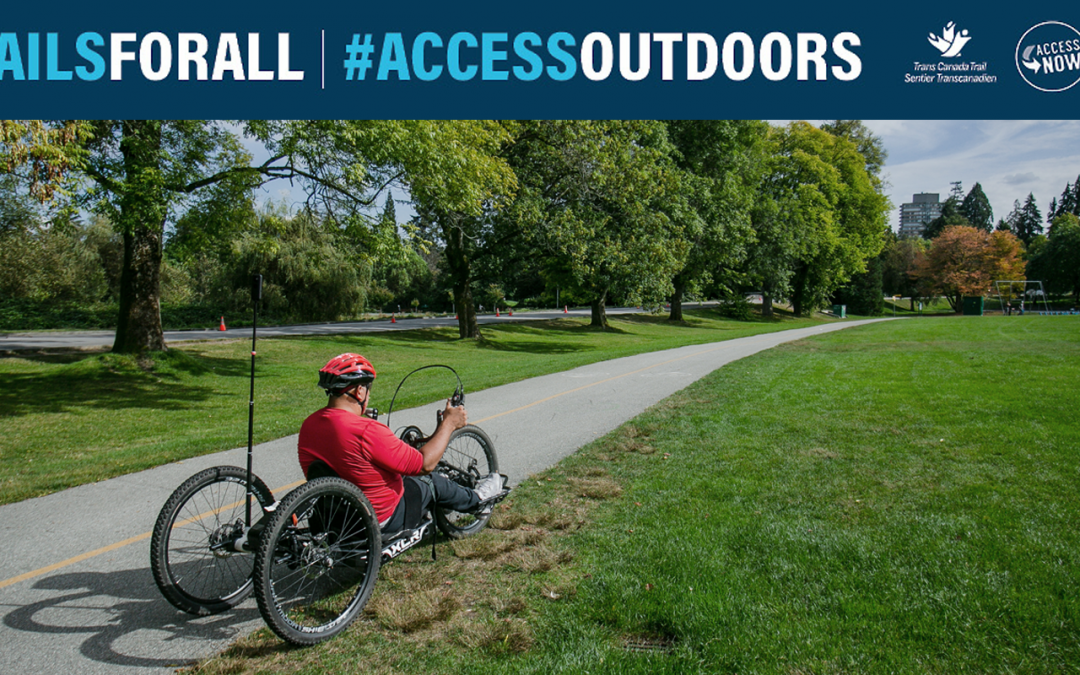Trans Canada Trail (TCT) and AccessNow are excited to announce a new partnership aimed at increasing accessibility on trails across Canada. By working together on initiatives that lead to information being shared via the AccessNow app, Canadians will be able to discover barrier-free routes as well as identify areas where barriers still exist so they can be addressed, resulting in increased accessibility along The Great Trail.
Trans Canada Trail and AccessNow are thrilled to announce that they are working together with the Canadian Paralympic Committee and that Paralympians and Para athletes are working to map the accessibility of trails across the country. The project will use the AccessNow platform and technology to highlight lived experiences and provide people with a navigational resource to discover trail accessibility.
“Trans Canada Trail is delighted to announce this exciting partnership and to be part of this important initiative which will enhance accessibility along sections of The Great Trail of Canada. We are honoured to work with AccessNow and with Paralympic and Para athletes who are helping us to ensure that we include the perspectives of people with a broad range of disabilities in our Trail project decisions,” said Eleanor McMahon, President & CEO of Trans Canada Trail.
“Canadians have told us that during these difficult times, they value access to natural spaces to stay active, take care of their mental health, and socially connect with others while respecting physical distancing and public health directives. This partnership is incredibly important especially now as trails have become a lifeline for Canadians,” McMahon added.
During a time when sport competition was put on hold and the Tokyo Paralympic Games was postponed due to the COVID-19 pandemic, a number of Canadian Paralympians and Para athletes are giving back to their local communities by participating in this important project. Using the AccessNow App, their feedback to trail operators will identify barriers that prevent people with physical disabilities from using trails. Each athlete is paired with a local trail guide to support the documentation of information.
“At AccessNow we are focused on connecting people to accessible opportunities and we are so excited about this partnership. Access to outdoor recreation is something that we should all be able to experience and it is so important that a disability lens be included. Every point added to the AccessNow platform is one more instance that provides insight and visibility to just how accessible trails across Canada really are,” says Maayan Ziv, Founder & CEO of AccessNow. “It is an honour to work closely with the athletes involved in this project, their voices and perspectives contribute to the ‘nothing about us without us’ mandate that we pride ourselves on celebrating across Canada” she adds.
Trail mapping is underway in 10 provinces and 1 territory, involving 13 Trail sections, and will conclude in spring 2021. TCT will work closely with local trail operators to implement recommendations from the athletes to improve accessibility on these trails. Trail accessibility information will be shared on the AccessNow app, a crowdsourced-driven information source that pinpoints the accessibility status of locations around the world.
Sections of the Trail being mapped and reviewed:
- Banff Legacy Trail, Banff, AB
- Bow River Pathway, Calgary, AB (Cody Dolan)
- Capital Pathway, Ottawa, ON (Camille Bérubé)
- Confederation Trail, Charlottetown, PEI (Alan Stanley)
- The Forks and North Winnipeg Parkway, Winnipeg, MB (Colin Mathieson)
- Western Loop – Harvest Moon Trailway, Annapolis Valley, NS (Ben Brown)
- Les Grandes-Fourches, Sherbrooke, QC (Diane Roy)
- Millennium Trail Connector, Whitehorse, YT (Tanelle Bolt)
- Pan Am Path, Toronto, ON (Andrew Haley)
- Quidi Vidi Lake Trail, St. John’s, NL (Liam Hickey)
- Riverfront Trail, Moncton, NB (Matthew Kinnie)
- Stanley Park, Vancouver, BC (Richard Peter)
- Wascana Valley Trails, Regina, SK (Jessica Frotten)
“The Paralympic Movement is about celebrating inclusivity and promoting accessibility, not just in sport but in our communities,” says Martin Richard, Executive Director of Communications & Brand at the Canadian Paralympic Committee. “This is an important project to make these valued outdoor spaces more accessible for all Canadians to be active, and we are pleased to be involved. The lived experiences of the participating athletes allow them to offer a valuable perspective and expertise that will open up opportunities for others, ultimately resulting in more people being able to enjoy the great Canadian outdoors.”
Once the trail mapping is complete, TCT is committed to taking concrete action to improve accessibility on the selected Trail sections, and across its network in general. It is anticipated that the sections of The Great Trail that are mapped will be added to the AccessNow app in April 2021.


In Squamish BC we are developing a remarkable trail Network allowing people with disability to access our natural landscape and forests. The Squamish Trail Society would be the contact organization. We had afederal grant that allowed us to resurface a number of trails for electric wheelchairs and scooters. FYI we are a wonderful costal community situated between West Vancouver and Whistler.